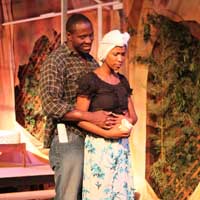
Nat Turner: Following Faith
5041 West Pico Blvd. Los Angeles
There were over 20 slave revolts in North America, but it was the one led by Nat Turner (1800-1831) that may be the most famed and that has left its imprint on the American imagination. In August, 1831, Turner's band of sixty Blacks slew fifty whites, men, women and children, during the brief rebellion. In retaliation, whites subsequently killed 200 Blacks, both slaves and free men. Turner was literate, articulate, an orator and a charismatic leader. What drove Nat Turner to take this form of direct, violent action against his oppressors, especially while he may have instinctively deplored extreme violence himself? The answer lies in the institution of slavery itself. The brutalities, the beatings, the rapes, the separations of families, the broken promises, the daily affronts year after year----the accumulation of all these indignities aggregate in a wave of forces that impel Turner to take the path he chooses, that indeed, he may have seen violent revolt as the obvious course of action. Playwright Paula Neiman, in Nat Turner: Following Faith, distinguishes her account from other accounts of Turner by making plain that it is the bitterness of slavery itself that drives him to his actions. Gabriel Prosser, a predecessor abolitionist and insurrectionist (whom Turner never actually met) is suggested as a possible inspiration, and appears as an onstage narrator. Turner quotes the Bible several times. But it is Slavery itself that ignites revolution, and it is Slavery that Turner is driven to expunge.
Thru - Dec 6, 2015
